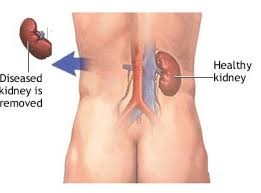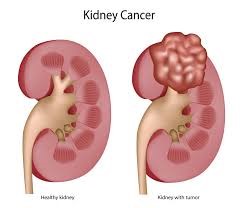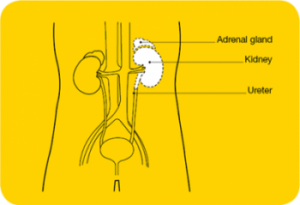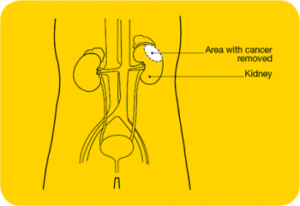A brief about Nephrectomy:
A nephrectomy is a surgical procedure for the removal of a kidney or section of a kidney. Nephrectomy, or kidney removal, is performed on patients with severe kidney damage from disease, injury, or congenital conditions. These include cancer of the kidney (renal cell carcinoma); polycystic kidney disease (a disease in which cysts, or sac-like structures, displace healthy kidney tissue); and serious kidney infections. It is also used to remove a healthy kidney from a donor for the purposes of kidney transplantation.
A nephrectomy is done when:
- your kidney is damaged
- your kidney is no longer functioning properly
- you have kidney cancer
- you’re donating your kidney
Description
Nephrectomy may involve removing a small portion of the kidney or the entire organ and surrounding tissues. In partial nephrectomy, only the diseased or infected portion of the kidney is removed. Radical nephrectomy involves removing the entire kidney, a section of the tube leading to the bladder (urethra), the gland that sits atop the kidney (adrenal gland), and the fatty tissue surrounding the kidney. A simple nephrectomy performed for living donor transplant purposes requires removal of the kidney and a section of the attached urethra.
Reasons behind for kidney Removal:
Damaged Kidney
You may need to have part or your entire kidney removed if isn’t functioning properly. Reasons for removal include damage or scarring. These may be due to disease, injury, or infection. Cancer is another reason to remove a kidney. If a kidney tumour is small and you catch it early, only part of your kidney may need to be removed.
Donating a Kidney
Sometimes, a person will donate their healthy kidney to someone who needs a new kidney. Kidney transplants are more successful with kidneys from living donors than deceased donors. You can be healthy with only one kidney.
Causes and Risk Factors
The cause of kidney cancer is unknown. The risk factors for kidney cancer include:
- being an older age
- being male
- being a long-term smoker
- having hypertension
- having long-term dialysis due to renal failure
- being obese
- having a horseshoe kidney, which is a type of congenital defect
- having polycystic kidney disease
- being exposed to toxins in the workplace

Common kidney cancer symptoms
The most common sign of kidney cancer is blood in the urine, known as hematuria. Other possible kidney cancer symptoms may include:
- Persistent pain in the side of the abdomen or the back, which is not the result of an injury.
- A mass or lump in the abdomen.
- Feeling fatigued.
- Unexplained, sometimes rapid, weight loss.
- A fever that is not due to an illness.
Active surveillance
Sometimes the doctor may recommend monitoring the tumour closely with regular diagnostic tests and clinic appointments. This is called active surveillance. Active surveillance is effective in older adults and patients who have a small renal tumour and other serious medical conditions, such as heart disease, chronic kidney disease, or severe lung disease. Active surveillance may also be used for some patients with kidney cancer, even if it has spread to other parts of the body (metastasized).
Active surveillance is not the same as watchful waiting. Watchful waiting involves regular appointments to review symptoms, but patients do not have regular diagnostic tests, such as biopsy or imaging scans. The doctor simply watches for symptoms. If symptoms suggest that action is needed, then a new treatment plan is considered.
Surgical procedures
Radical nephrectomy
During a radical nephrectomy, your surgical oncologist removes the entire affected kidney. Often, the adrenal gland is also removed if it is involved with, or very close to, the tumour. During this type of surgery, your oncologist may make incisions in the abdomen, under the ribs, or in the back to remove the entire kidney.
Laparoscopic radical nephrectomy (LRN)
For most patients, our surgical oncology experts perform an LRN instead of a radical nephrectomy because it requires less recovery time and causes less bleeding. An LRN is performed by making a few small incisions, instead of one large incision. One of the incisions will be slightly larger than the others to allow the kidney to pass through. Once the incisions are made, your surgical oncologist uses a laparoscope (long tube with small camera attached to the end) to help guide removal of the kidney.
Partial nephrectomy
We perform this type of kidney cancer surgery when it is important to preserve kidney function. This includes people who have cancer in kidneys, low kidney function, or people with one kidney. During this procedure, your surgical oncologist removes only the part of the kidney that contains cancer. Your surgical oncologist may recommend this surgery even if these issues don’t pertain to you, to maintain as much kidney function as possible.
If kidney cancer has metastasized, your treatment team may combine surgery with targeted therapy or immunotherapy. Your team of doctors will assess every aspect of your disease and recommend a treatment plan tailored to your individual needs.
Metastatic Kidney Cancer
Metastatic kidney cancer can’t be treated with surgery alone. After as much tumour is removed as possible with surgery, other treatments remain necessary. These may include immunotherapy, targeted therapy, and radiation. The treatments can have side effects.
Immunotherapy
Immunotherapy uses synthetic versions of immunoactive chemicals found in the body. Interferon and aldesleukin (Proleukin) are examples of drugs used in immunotherapy.
Procedure is Performed on:-
Kidney removal may be recommended for:
- Someone donating a kidney
- Birth defects
- Kidney cancer
- A kidney damaged by infection, kidney stones, or other problems
- To help control high blood pressure in someone who has problems with the blood supply to their kidney
- Very bad injury (trauma) to the kidney that cannot be repaired
Before the Procedure
Always tell your health care provider:
- If you could be pregnant
- What drugs you are taking, even drugs or herbs you bought without a prescription
During the days before the surgery:
- You will have blood samples taken in case you need a blood transfusion.
- You may be asked to stop taking aspirin, ibuprofen (Advil, Motrin), naproxen (Aleve, Naprosyn), Clopidogrel (Plavix), warfarin (Coumadin), and other blood thinners.
- Ask your provider which drugs you should still take on the day of the surgery.
- Do not smoke. This will help you to recover quicker.
On the day of the surgery:
- You will most often be asked not to drink or eat anything after midnight the night before the surgery.
- Take the drugs as you have been told, with a small sip of water.
- You will be told when to arrive at the hospital
After the Procedure
You will stay in the hospital for 2 to 7 days, depending on the type of surgery you have. During a hospital stay, you may:
- Be asked to sit on the side of the bed and walk on the same day of your surgery
- Have a tube, or catheter, that comes from your bladder
- Have a drain that comes out through your surgical cut
- Not be able to eat the first 1 to 3 days, and then you will begin with liquids
- Be encouraged to do breathing exercises
- Wear special stockings to prevent blood clots
- Receive shots under your skin to prevent blood clots
- Receive pain medicine into your veins or pills
- Recovering from open surgery may be painful because of where the surgical cut is located. Recovery after a laparoscopic procedure is most often quicker, with less pain.
Prevention of Kidney Cancer
Living a healthy lifestyle is the best way to reduce your risk of kidney cancer. Specific steps you can take to reduce your risk include:
- not smoking
- eating a balanced diet
- maintaining a healthy weight
- protecting yourself from chemical toxins at work
- controlling your blood pressure
Aftercare and recovery
Immediately after surgery, your health care team will carefully watch your blood pressure, electrolytes and fluid balance. These body functions are controlled in part by the kidneys. You will most likely have a urinary catheter (tube to drain urine) in your bladder for a short time during your recovery.
You may have discomfort and numbness (caused by severed nerves) near the incision area. Pain relievers are given after the surgical procedure and during the recovery period as needed. Although deep breathing and coughing may be painful because the incision is close to the diaphragm, breathing exercises are important to prevent pneumonia.
You will probably remain in the hospital for 1 to 7 days, depending on the method of surgery used. You will be encouraged to return to light activities as soon as you feel up to it. Strenuous activity and heavy lifting should be avoided for 6 weeks following the procedure.
Your doctor will give you more detailed instructions about your post-operative activities, restrictions and diet.
Care of the remaining kidney
Tests will be done on a regular basis to check how well the remaining kidney is working. A urinalysis (urine test) and blood pressure check should be done every year, and kidney function tests (creatinine, glomerular filtration rate [GFR]) should be checked every few years (or more often if abnormal results are found). Regular urine tests for protein should be performed as well. The presence of protein in the urine may mean that the kidney has some damage.
People with one kidney should avoid sports that involve higher risks of heavy contact or collision. This includes, but is not limited to, boxing, field hockey, football, ice hockey, lacrosse, martial arts, rodeo, soccer and wrestling. This may also include extreme activities such as skydiving. Anyone with a single kidney who decides to participate in these sports should be extra careful and wear protective padding. He or she should understand that losing the remaining kidney is a very serious situation.
Normal results of a nephrectomy are dependent on the purpose of the procedure and the type of nephrectomy performed. Immediately following the procedure, it is normal for patients to experience pain near the incision site, particularly when coughing or breathing deeply. Renal function of the patient is monitored carefully after surgery. If the remaining kidney is healthy, it will increase its functioning over time to compensate for the loss of the removed kidney.
Length of hospitalization depends on the type of nephrectomy procedure. Patients who have undergone a laparoscopic radical nephrectomy may be discharged two to four days after surgery. Traditional open nephrectomy patients are typically hospitalized for about a week. Recovery time will also vary, on average from three to six weeks.
Alternatives
Because the kidney is responsible for filtering wastes and fluid from the bloodstream, kidney function is critical to life. Nephrectomy candidates diagnosed with serious kidney disease, cancer, or infection usually have few treatment choices aside from this procedure. However, if kidney function is lost in the remaining kidney, the patient will require chronic dialysis treatments or transplantation of a healthy kidney to sustain life.
Survival Rates for Kidney Cancer by Stage
Survival rates for kidney cancer are higher when the condition is treated in its earlier stages. For example, the American Cancer Society reports that the observed five-year survival rate for stage 1 kidney cancer is 81 percent. Keep in mind that observed survival rates are estimates. The actual survival rate is likely to be higher.
